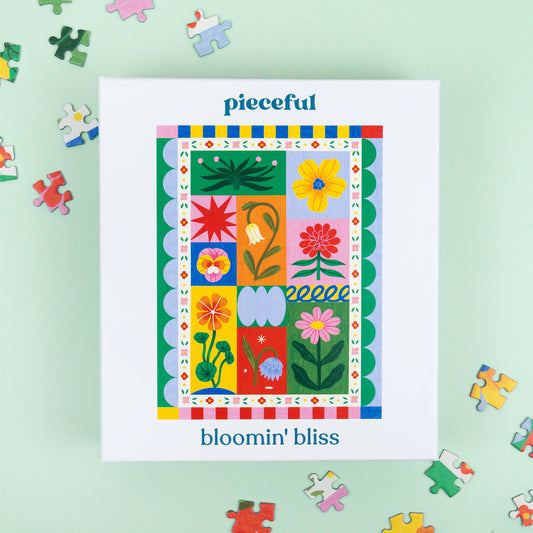you’ve clocked out, but your brain’s still spinning like a hamster on triple espresso . the quickest fix? choose one slow, screen-free ritual and stick with it. a short walk, a few puzzle pieces, or just staring at the ceiling (yes, that counts) can reset your whole evening.
if you need something foolproof, grab a cup of tea and open a puzzle from pieceful jigsaws. their calming designs + zero phone time = instant mind shift.
bonus points if you add a candle, blanket, and music you loved in 2010. nostalgia works faster than caffeine.
5 slow-evening swaps for instant calm
the shift from work mode to rest mode doesn’t just happen you have to invite it in. start by setting a gentle “no work after” time. maybe it’s 6:37pm, maybe earlier. close your laptop, leave your workspace, and give your mind permission to breathe, slow down, and fully switch off.
do a buffer activity
witch to a gentle “no work after” time. maybe it’s 6:37pm, maybe 5:59pm (we love an early finish). the key is sending a clear signal to your brain that you’re officially off-duty. this isn’t about strict rules it’s a little daily gift to yourself, wrapped in calm. try pairing it with these stress management tips from mayo clinic for the perfect wind-down 🌿.
- close your laptop
- leave your workspace
- change into comfy clothes
- pour a drink you love
- light a candle
these tiny acts tell your mind you’re in rest mode, not work mode. when you repeat them daily, they become a ritual your brain recognises instantly a soft, gentle doorway from the busy world into your own cosy little evening .

puzzle your brain into peace
puzzling is like giving your mind a gentle hug. no rush, no rules, just the quiet satisfaction of pieces clicking into place. it’s a rare moment where your thoughts take a back seat, and your hands lead the way slow, steady, and completely screen-free .
- it shifts your focus from thoughts to hands
- it’s screen-free calm in its purest form
bonus: pairs perfectly with tea + cosy lighting
each piece you place is a little act of grounding. before you know it, the day’s noise has faded and you’re wrapped in the soft glow of focus and calm. try a pieceful puzzle and let your mind rest, one satisfying click at a time .
create a vibe with sound
sound has the power to melt away stress faster than any to-do list tick. swapping tv noise for intentional music turns your space into a little sanctuary. it’s not just background it’s a gentle signal to your body and mind that it’s time to slow down, breathe, and feel at ease.
- soft jazz
- nature sounds
- your “teen years” playlist for a nostalgia hit
pair these sounds with a puzzle, a warm bath, or candlelight for full sensory relaxation. let each note wrap around you like a blanket, carrying you out of the day’s chaos and into a softer, slower evening rhythm.

try the ‘no-scroll’ night
one night a week, set your phone aside like it’s on a mini holiday. give your mind a break from constant pings and endless feeds. instead, create space for slower, deeper moments that feel good for no reason other than they do. your future self will be so grateful.
- a slow dinner
- journaling by candlelight
- reading in bed
- puzzling with your partner
no-scroll nights are tiny acts of nervous system care. you’ll feel more present, sleep better, and maybe even remember what quiet sounds like. swap the scroll for real connection with yourself, someone you love, or a beautiful pieceful puzzle.
use the 10-minute rule
sometimes the hardest part is starting. the 10-minute rule is your secret weapon commit to just a tiny slice of calm, no big promises. it tricks your brain into showing up without the weight of “i have to do this all night”. gentle, easy, and surprisingly effective.
- a few puzzle pieces
- one page of writing
- a cup of tea, sipped without multitasking
once you begin, the calm often lingers longer than planned. those 10 minutes might stretch into 30, and before you know it, you’ve built yourself an evening of peace without even trying. pieceful puzzles make the perfect low-effort starting point.
redefine what winding down means for you
forget the “shoulds” and let your peace be whatever feels right. maybe it’s journaling, gentle stretching, slow knitting, or simply staring out the window with a cup of tea. if it soothes your mind and keeps your phone out of reach, it’s valid . calm is personal make it yours.
your wind-down routine doesn’t need to look like a wellness influencer’s perfect evening. it can be messy, quiet, weird, or wonderfully simple. the only rule? it should make you feel more human and less like a tired email machine . try adding a pieceful jigsaw puzzle for an easy, screen-free way to sink into calm.
- if you’re restless, move stretch, tidy, or water your plants
- if you’re drained, sink lie down, breathe, and do absolutely nothing
- if you’re scattered, focus a puzzle, a book, or a single mindful task
the beauty of winding down your way is that it’s sustainable. you’re not forcing yourself into a rigid routine you’re choosing moments that work for you. over time, those moments stack up, creating a rhythm your body trusts. and that’s where the magic really is.
ready to stop ending your day with a thumb cramp?
after-work scrolling tricks you into thinking you’re resting, but your brain stays on high alert . you keep chasing “one more post” until you’re tired, wired, and staring at the ceiling at midnight. it’s not rest it’s just overstimulation dressed as downtime, and your mind deserves better.
start your slow evening with pieceful puzzles . our calming scenes, soft playlists, and zero-pressure pace help you swap the scroll for stillness. each piece clicks you deeper into focus and ease, giving your nervous system the reset it’s been craving. let your brain exhale and remember what a real, unhurried evening feels like.
faqs
how can i switch off quickly after work?
pick one tactile, screen-free ritual. maybe it’s a puzzle, brewing tea, or a short walk outside. your brain needs a clear, consistent signal that you’re off-duty. when you repeat the same action after work, it becomes a habit telling your mind “we’re done for today” and gently guiding you into relaxation mode.
why is doomscrolling so bad for relaxation?
doomscrolling keeps your brain buzzing like a fridge at 3am . endless content triggers micro-stress responses, making it harder to calm down or sleep well. instead of winding down, you stay in alert mode. swap scrolling for soft, steady activities puzzles, journaling, or tea rituals and notice how much faster your body settles.
what’s the easiest screen-free habit to start?
puzzles are the ultimate low-effort, high-reward habit . no setup stress, no skill needed just open the box and start. the tactile, repetitive action pulls you in, helping your thoughts slow without trying. they’re screen-free, satisfying, and easy to pair with tea or music. you’ll feel the shift from busy to calm within minutes.
how often should i have a no-scroll night?
start with once a week. that’s enough to notice better sleep, more presence, and less phone craving. treat it like a mini retreat replace scrolling with puzzles, slow dinners, journaling, or candlelit baths. over time, you might naturally add more no-scroll nights because you’ll love how calm they make you feel .
what if i don’t like puzzles?
no problem choose any hands-on, screen-free hobby that brings calm. journaling, knitting, baking, or even tending to plants can work beautifully. the key is engaging your senses and attention without a phone. experiment until you find something that feels soothing, then make it a small, regular ritual to help you fully switch off.





